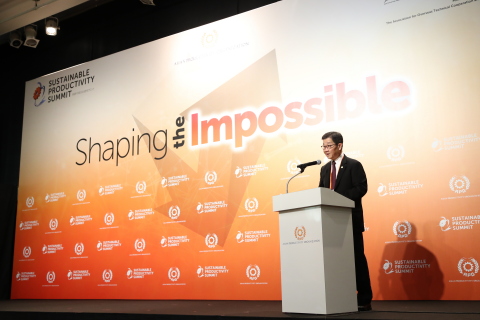Trending Now
- 830 voters names go missing in Kavundampalayam constituency
- If BJP comes to power we shall consider bringing back electoral bonds: Nirmala Sitaraman
- Monitoring at check posts between Kerala and TN intensified as bird flu gets virulent in Kerala
Businesswire
APO Adopts Strategic Foresight-Based Approach to Make Member Countries Future-Ready
July 18, 2018
To enable member economies to adopt digital technologies in the industry, agriculture, public, and service sectors for holistic socioeconomic development, the Asian Productivity Organization (APO) is incorporating a strategic foresight-based approach and practices to assist them in developing future-ready capabilities and national productivity frameworks.
This press release features multimedia. View the full release here: https://www.businesswire.com/news/home/20180711005920/en/

APO Secretary-General Dr. Santhi Kanoktanaporn delivering welcome remarks at the Sustainable Productivity Summit 2018 in Tokyo, 10 July 2018. (Photo: Business Wire)
At the first APO Sustainable Productivity Summit, Secretary-General Dr. Santhi Kanoktanaporn stated that accelerating economic and technological changes had generated multiple global challenges ranging from climate change to emerging crises in food, energy, water, financial markets, and the global economy. “At the same time, those changes have also brought development and prosperity to much of the world. Central to this story of change has been productivity, in the form of new ideas, technologies, and skills that drive growth. Productivity will remain the key engine of growth in the future.”
The Secretary-General reported that the APO had set up a Futures Team and started using artificial intelligence (AI) to identify emerging global trends and driving forces to develop initiatives that promote not only traditional productivity but also sustainable productivity. “Corporate leaders and decision makers in government who adopt the business-as-usual approach risk being left behind. We cannot rely only on existing models and expect to remain relevant in the decades to come,” warned Dr. Santhi.
In his opening remarks, Deputy Director General Dr. Minoru Masujima of the International Cooperation Bureau, Ministry of Foreign Affairs of Japan, acknowledged that the rise of the Internet of Things, big data, robotics, and AI had resolved social issues by creating innovative businesses and services: “Such innovations contribute not only to efficiency and labor saving but potentially boost productivity through creating totally new added value in Society 5.0.”
Delivering the keynote address, Deloitte Center for Government Executive Director William D. Eggers stressed that good government mattered a great deal when it came to a nation’s productivity. “It can either deter it or help to accelerate it,” he said, adding that, “In an age of exponential technologies, governments need to close the growing gap between how the private sector is adopting these technologies and transforming work and how the public sector now operates.”
“Governments around the world are wrestling with how to regulate technologies like AI, drones, and autonomous vehicles in ways that protect the public but allow companies to innovate. How governments regulate these technologies will have a big impact on how the technologies progress,” he concluded.
The APO Sustainable Productivity Summit will be followed by a two-day Strategic Planning Workshop where APO Directors and Heads of National Productivity Organizations review specific requirements and draft future development programs.
Speakers at the Summit included Ryan Janzen, Co-Founder and Chief Technology Officer, TransPod Inc., on the impact of emerging technologies such as the hyperloop and tube transport; Dr. Niklas Arvidsson, Associate Professor, Department of Industrial Economics and Management, KTH Royal Institute of Technology, on key factors in the development of a cashless society; Andrew W. Brentano, Chief Executive Officer, Tiny Farms Inc., on alternative options to conventional crops and practices; and Takeshi Arakawa, SST Management Team Manager of the Business Solution Division, Panasonic Corporation, on sustainable smart towns and smart homes.
View source version on businesswire.com: https://www.businesswire.com/news/home/20180711005920/en/
MULTIMEDIA AVAILABLE :
Source: Businesswire














